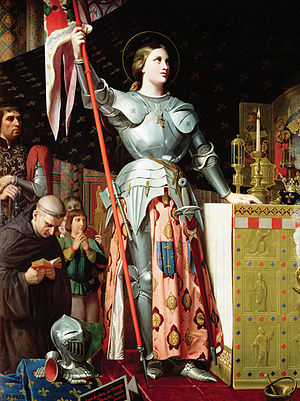Imagine yourself as a child, and imagine being able to hear the voices of the divine, the voices of angels such as Michael the Archangel. Imagine that every time you heard these voices you would see a bright light and you would feel a sense of security. Now imagine that your country had been invaded by those you had been at war with, and these voices came to you and tasked you with the mission to drive that enemy from your land. That was what life was like for young Joan of Arc. She heard the voices of the divine and accepted the challenge to drive out the English from France and to restore her country to what it once was. It was in 1429 when France came face to face with Joan, a young girl, just seventeen years old claiming to hear the voices of angels. Even so, the French knew of her coming because it had been prophesied before she was born, that “France would be ruined by a woman and restored by a virgin from the oak forest of Lorraine.”1

Joan of Arc, born around January of 1412, claimed early in her life that she was divinely inspired to help her country of France in the wake of the political and military turmoil facing her land. When she was in her early teens, she had witnessed a light, soon followed by voices that would speak to Joan with mild commands, “Be good” and “Go to church often.” She had said it was St. Michael who had spoken to her, but he was also accompanied by many angels as well, one of which was St. Gabriel. As she continued to listen to the voices of the divine, she came to realize her purpose, and that purpose was to save her people of France from their enemies. It was 1429 when Joan of Arc heard the voices telling her that it was time to begin her mission, the mission that they had been preparing her for.2
The Hundred Years’ War was a war between the two kingdoms of England and France. It lasted actually for 116 years, beginning in May 1337, and lasting until 1453. The war began when King Edward III of England, the grandson of French monarch Philip IV the Fair, claimed the French throne when the French king Charles IV died without a male heir to the throne.3 Throughout the war, the English had dominated and overpowered France, winning significant battles, such as the Battle of Crecy, the Battle of Agincourt, and the Battle of Poitiers. It was because of these battles and many other victories for England that many believed that the ultimate winner would be the English, and because most of the battles were fought on French territory, France was faced with a destroyed and battered country.

Even so, Joan of Arc was afraid at the enormity of what God was asking her to do. Yet she met His commands with determination and vigor. Joan dressed in male armor and cut her hair as a fallback so that none would be able to tell she was a woman and deny her the opportunity to fight and carry out her mission in the war. With this she took up the sword gifted to her by the angels and began her trek to meet the Dauphin, the yet-to-be-crowned King Charles. Once she came face to face with the Dauphin Charles, Joan of Arc was not immediately recognized as a leader, but she had told the Dauphin that she was sent to him by the voices of God to drive away the English soldiers. Ultimately, she convinced him to let her join the war. The Dauphin soon sent Joan to the Siege of Orleans (October 1428-May 1429).When she arrived, she raised the morale of the troops, allowing the French soldiers to break the siege only nine days later. Soon after, Joan and the French troops went on to take over several English strongholds, and because of the break in the siege and the victories afterward, it allowed the Dauphin Charles VII to march to Reims for his coronation. The siege was the first major victory for the French and the first victory for Joan as well. After the Siege of Orleans, Joan was recognized by King Charles VII as a leader. Joan went on to lead more troops, gaining more victories for France, finally turning the tide of the war.4

That all came to an end, however, when Joan of Arc was captured at Compiegne in May 1430. Upon her capture by English forces, Joan was accused of heresy and witchcraft. On January 9, 1431, her heresy trials began. Joan of Arc had six public examinations and nine private examinations in total. At the end of the trial, the judges composed The Twelve Articles of Accusation, which were the charges accusing her of hearing the voices of the divine and of dressing in men’s clothing, all confirmed by Joan of Arc herself. At the end of the trial, the church’s officials agreed that Joan’s actions and words were evil. They began their final sentence, and Joan agreed to obey all of the rulings made by the Church. She was welcomed back into the Church, but condemned to solitary penance in prison, so she could never commit another crime again. Despite agreeing to begin wearing female clothing again, four days after her sentence, Joan of Arc was seen in prison wearing male clothing, defying the agreed terms of the Church. Soon Bishop Cauchon and seven judges went to Joan of Arc’s cell and questioned her over her wearing men’s clothing. Upon arriving, the Bishop asked why she began wearing men’s clothing again, and she stated, “I had done this on my own free will. Nobody has forced me; I prefer the apparel of a man to that of a woman.”5 When asked why she had done this, she stated that it was more proper to wear men’s clothing than women’s because she was surrounded by men. She also stated that in her time spent in the prison she had been molested by the English when she was wearing women’s attire. The Bishop then asked if she had been hearing the voices of saints again, and when she answered yes, he asked about what they had told her. Joan of Arc had told the Bishop Cauchon that she had endangered her soul by recanting and that she was being condemned because she was trying to save her life. Joan also told him that if God did not want her to recant then she would listen to His word. With this the Bishop stated that she was a “relapsed heretic,” and that the church would have to take legal measures by proceeding “according to law and reason.”6 Joan was charged with relapsing into heresy on May 28,1431, because Joan of Arc had ignored the Church and admitted to hearing the voices of saints and started re-wearing men’s clothing. She was then sentenced to death, to be burned at the stake two days later, on May 30.7

During and after Joan of Arc’s trial, the French forces became timid and soft, but ultimately won the war in 1453. After the war, King Charles VII ordered a review of Joan of Arc’s trial, even though the Roman Catholic Church did not formally begin the canonization process till 1869 and even then was not declared a saint for another fifty years.8 France celebrated and recognized Joan as a national hero because Joan of Arc fulfilled the prophecy that was foretold, listened to the premonitions she received from God, and never strayed from her beliefs. The French believe she was a key factor in the war because she came to France’s aid when they were at their breaking point. Joan of Arc broke the Siege of Orleans and pushed the English back, allowing France to reclaim what they had lost. She is a hero not only of France, but she is a representation of courage and independence and to this day continue to celebrate her life and her legacy.9
- Soren Bie, “Prophecies,” Joan of Arc (Jeanne D’Arc) 1412 – 1431, 9 July 2017, www.jeanne-darc.info/biography/prophecies/. ↵
- Kathryn Harrison, Joan Of Arc: A Life Transfigured (New York: Doubleday, 2014) 1, 17-20. ↵
- World History Encyclopedia, 2011, s.v. “The Hundred Years’ War,” by Alfred J. Andrea. ↵
- Julien Thery “How Joan of Arc Turned the Tide in the Hundred Years’ War,” National Geographic, April 13, 2017, https://www.nationalgeographic.com/archaeology-and-history/magazine/2017/03-04/joan-of-arc-warrior-heretic-saint-martyr/. ↵
- Julien Thery, “How Joan of Arc Turned the Tide in the Hundred Years’ War,” National Geographic, April 13, 2017, https://www.nationalgeographic.com/archaeology-and-history/magazine/2017/03-04/joan-of-arc-warrior-heretic-saint-martyr/. ↵
- Julien Thery “How Joan of Arc Turned the Tide in the Hundred Years’ War,” National Geographic, April 13, 2017, https://www.nationalgeographic.com/archaeology-and-history/magazine/2017/03-04/joan-of-arc-warrior-heretic-saint-martyr/. ↵
- Craig Taylor, Joan of Arc: La Pucelle (New York: Manchester University Press, 2006), 205, 207, 216, 220, 222. ↵
- Mary Gordon, Joan of Arc (New York: Lipper/Viking, 2000), 166. ↵
- Julien Thery “How Joan of Arc Turned the Tide in the Hundred Years’ War,” National Geographic, April 13, 2017, https://www.nationalgeographic.com/archaeology-and-history/magazine/2017/03-04/joan-of-arc-warrior-heretic-saint-martyr/. ↵



40 comments
Max Lerma
Joan of Arc was an amazing figure in her time and this article did a great job in capturing just that. This was a article that depicted the rich history of the times and the eventful life of Joan of Arc. This article was a great historical piece on the era, but it did not read like one. It kept me interested in what would come next for Joan of Arc.
Engelbert Madrid
I enjoyed reading this article based upon the heroic actions of Joan of Ark. Before reading this article, I thought Joan of Ark was just a legend. However, she was a true warrior that helped her country fight against the British that were invading her country’s territory. Also, she was faithful to her religious faith on God and she promised to follow her faith.
William Rittenhouse
Joan of Arc will be remembered as a women of God who was gifted with extreme leadership authority. She is a perfect example of strong people are born out of bad times. She is also a women leading an army which was exceptionally rare during that time and all throughout history. I’m sure women’s rights people love her for being the image of a strong fearless leader. She showed tremendous faith in God and was burned at the stake because of it. She is a very inspirational martyr we should all look up to.
Eloisa Sanchez Urrea
I found this to be a very interesting article. I had heard of Joan of Arc but I didn’t know the significance or the story behind the name. I found it very ironic that a woman who could hear God’s words was charged with being evil and practicing witchcraft. I also found it empowering that a woman was brave enough and faithful enough to follow God’s words.
Montserrat Moreno Ramirez
Joan of ark, will always be a hero whose story will be told for many further generations. it was a really interesting reading, everyone has hear of this character at least once, and it’a amazing all she did in spite of the horrible conditions she was in and all she had to go through. What she did in France was a really changing and inspirational thing that helped many people for which they must be thankful. Also she is an icon to inspire women!
Christopher Hohman
Nice article. Joan of Ark’s help to the forces of France during the hundred years war was very significant. She was a morale booster and the men of the French army must really have adored her. Still though one has to wonder if she really was hearing the voices of the divine. She may have been suffering from a mental illness that was not diagnose-able at the time. Whatever the case what she did for France can never be forgotten, she was really quite something
William Ward
I have only ever heard the name Joan of Arc, but did not know about the story behind it. I unfortunately did not know of her bravery at Orleans, and the possible voices she heard to guide her to victory. One of the great women in history, it is good to hear that despite the hell she was, no doubt, put through was not in vein. Great story and very well written.
Emily Jensen
Joan of Ark has a story that will continue to be told for generations to come. Her bravery and her faith were unmatched during her pilgrimage on earth. For her to be burned at the stake really proves to us that the beliefs she held were strong and true to her. This article was well researched and well written, a great read overall.
Lamont Traylor
Joan of Arc is such an interesting person of history to me because of how she portrayed herself. Especially in that time when it was super uncommon for women to do most of the things that men would do such as leading armies into battle or fighting in the battle themselves, or even having any say so at all in important matters.
Mason Meza
This was a very interesting read. Joan of Arc is not something that i have heard of in the past. This article gave me lots of information, this gives many women inspiration because of the fact that this article was about a woman who did something very courageous and was viewed as a hero by many people, especially those who are females. She changed the lives of many people in France and that is something that is hard to do. Some would not even take the time to try and change the life of one person.